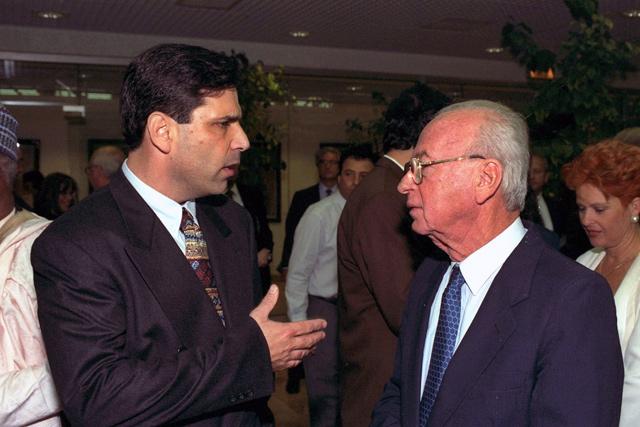You are here
Israel ex-minister sentenced to 11 years for spying for Iran
By AFP - Feb 26,2019 - Last updated at Feb 26,2019

In this file photo taken on July 05, 2018, Gonen Segev (centre), a former Israeli Cabinet minister indicted on suspicion of spying for Iran, is seen in court in Occupied Jerusalem (AFP photo)
OCCUPIED JERUSALEM — An Israeli ex-minister was sentenced to 11 years in prison Tuesday for spying for his country's main enemy Iran, with prosecutors saying the plea bargain was necessary to avoid revealing secret information.
Gonen Segev, who served as energy and infrastructure minister from 1995 to 1996, had previously agreed to a plea bargain on charges of serious espionage and transfer of information to the enemy.
Court hearings were held in secret due to the nature of the case.
Little was revealed of the motives of the 63-year-old, who was already disgraced after having been convicted for drug smuggling and attempted credit card fraud.
Prosecutor Geula Cohen confirmed to journalists outside the Jerusalem district court that the judge had accepted the plea bargain and issued the sentence.
Segev attended the closed hearing.
"He admitted having given information to the Iranians over five years," Cohen said.
"The agreement is aimed at protecting security sources and keeping information confidential. A longer trial would not have allowed all the information to be kept secret."
She added that "an Israeli who spied for Iran in Africa and who ends up in prison in Israel is an important victory".
Segev's lawyer Moshe Mazor said his client had expressed regret for his actions.
"We think that the verdict conforms with his actions and has not been lightened as much as some have written," he told journalists.
His lawyers had previously said a charge of treason had been dropped as part of the deal.
Contacts in Nigeria
The Shin Bet domestic security service previously accused him of providing Iran with "information related to the energy market, security sites in Israel, buildings and officials in political and security bodies and more".
The crimes occurred while he was living in Nigeria between 2012 and his arrest at Israel's Ben Gurion Airport in May 2018, according to Shin Bet.
It said Segev had been in contact with Iranian embassy officials in Nigeria and he later visited the Islamic republic for meetings with his intelligence handlers.
"Segev also met with his Iranian handlers in various hotels and apartments around the world which he assumed were used for covert activity," Shin Bet said when announcing his arrest.
"Segev even received secret communications equipment for encoding messages between him and his handlers."
He had attempted to visit Equatorial Guinea just before his arrest, but authorities there refused him entry due to his criminal record and transferred him to Israel at the request of Israeli police, the Shin Bet said.
Israeli media have reported that after his arrest he claimed to have wanted to act as a double-agent to help Israel.
Iran's intelligence minister, Mahmoud Alavi, said last year that Iran had placed an agent "in the Cabinet of a country that has a very strong intelligence service" in what was thought to be a reference to Segev.
But some Israeli observers cast doubt on the value of Segev's information.
"If Gonen Segev was Iran's biggest intelligence asset in Israel then we can continue to sleep soundly at night", columnist Ben Caspit wrote in Israeli newspaper Maariv after his arrest last year.
"Segev hasn't had access to any real information for two decades, and the damage that he could have caused Israel wasn't large."
Segev served in the Labour government of late prime minister Yitzhak Rabin after defecting from the far-right to cast the decisive vote in favour of the Oslo II peace agreement with the Palestinians.
He was also part of Shimon Peres's government after Rabin' assassination in 1995.
Segev, a medical doctor who had been barred from practising in Israel, has previously served prison time on criminal charges.
In 2004, he was charged with trying to smuggle 30,000 ecstasy pills into Israel from The Netherlands using a diplomatic passport with a falsified expiry date.
The following year, he admitted the charges as part of a plea bargain.
He has also been convicted of attempted credit card fraud.
Related Articles
OCCUPIED JERUSALEM — Israel has indicted a former Cabinet minister on suspicion of spying for Iran, Israel's Shin Bet internal security serv
OCCUPIED JERUSALEM — An Israeli ex-minister charged with spying for the country’s arch-foe Iran has reached a plea bargain with prosecu
OCCUPIED JERUSALEM — A former Israeli government minister went on trial on Thursday on charges of spying for arch-foe Iran in a case that ha













